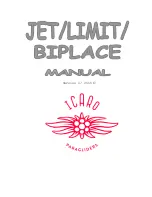
StEErinG and POWErinG
The power of your kite can easily be controlled with the bar. When the depower
loop is hooked in, the bar can slide over the depower line, which changes the
angle of attack causing the kite to produce more or less power.
For more information, more instructions and extra tips please refer to the
manual supplied with your bar.
We strongly recommend to use a Peter Lynn bar designed to be used with your
Peter Lynn LEI kite.
When pushing the bar away, the
power of the kite will be reduced.
When pulling in the bar, the kite will
produce more power. When pulling
in the bar while steering, the kite will
make tighter turns.
The power adjuster can be used to change the overall power of the kite.
To reduce the overall power of the
kite, pull in the line coming out of the
cleat to the desired position.
To increase the overall power of the
kite, pull the line slightly towards you
and move it away from the cleat. Now
let the line out and let it lock back
into the cleat at the desired position.
Summary of Contents for LEI series
Page 1: ......

































